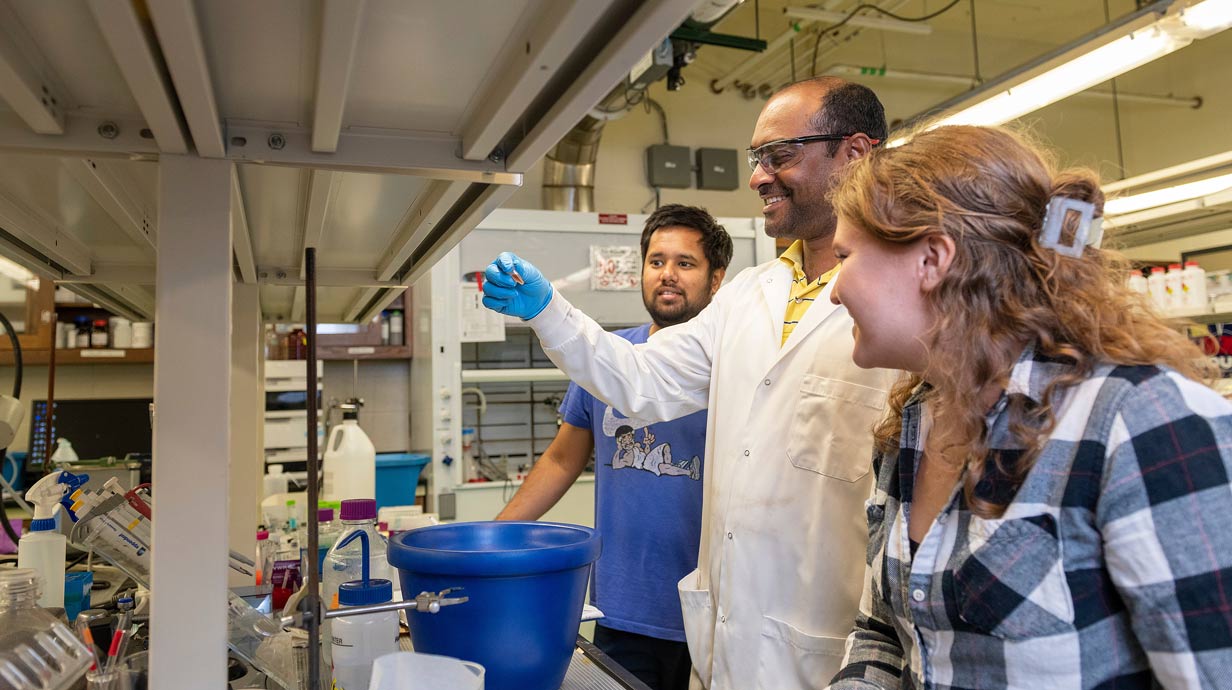Chemistry, M.S.
Develop advanced research skills that prepare you for a variety of careers.

About the Master of Science in Chemistry
The Department of Chemistry & Biochemistry in the College of Liberal Arts offers the M.S. in Chemistry. It is useful for careers requiring chemistry knowledge applied over a variety of settings such as patent law, government work, national defense, and private industry.
On this Page…
Program Information
Degree
M.S. in Chemistry
Required Credit Hours
30
Program Type
Master's Program
Program Location
School
Duration
2 years
We’re Here to Help!
If you have any questions about the M.S. in Chemistry, don’t hesitate to get in touch!
Ryan Fortenberry
Associate Professor of Chemistry and Biochemistry
M.S. in Chemistry Program Details
Learn about the application process, academic requirements, financial support, and the facilities available to you.
APPLICATION DEADLINE: Review begins in December with a deadline on April 1
The Department of Chemistry & Biochemistry welcomes student applications.
- Complete the Graduate School’s Online Application.
- Submit required supplemental materials for the Department of Chemistry and Biochemistry.
To be admitted to a graduate degree program in full standing, a student must have completed a B.S. degree in chemistry with an average grade of B. Exceptionally qualified students who have not completed a B.S. degree in chemistry but have a degree in a related field (such as biology, engineering, physics, pharmacology, or pharmacy) may be admitted. However they should expect to present a clear case in their personal statement for admission. Additionally, they should expect to be provisionally admitted until specified conditions are satisfied such as prerequisite coursework or other expectations.
Students in the M.S. in Chemistry complete 30 credit hours.
- 18 credit hours of chemistry courses
- Chem 700: Intro to Graduate Research
- 1 credit hour of Chem 659: Masters Seminar
- 1 credit hour of 750: Area Seminar
- 6 credit hours of Chem 697: Thesis
All M.S. students must take one core course from each of four of the five specialty areas.
Analytical Chemistry:
- Chem 512: Advanced Instrumental Analysis
- Chem 514: Fundamentals of Electrochemistry
- Chem 519: Chemical Separations
Biochemistry:
- Chem 534: Physical Biochemistry
- Chem 771: Biochemistry I
Inorganic Chemistry:
- Chem 544: Chemical Applications of Group Theory
- Chem 701: Advanced Inorganic Chemistry I
- Chem 702: Advanced Inorganic Chemistry II
Organic Chemistry:
- Chem 527: Adv. Organic Chem., Structural Mechanism
- Chem 528: Adv. Organic Chem., Structure Synthesis
Physical Chemistry:
- Chem 531: Advanced Physical Chemistry, Quantum Chemistry
- Chem 532: Chemical Thermodynamics
- Chem 536: Advanced Physical Chemistry, Reaction Dynamics
A cumulative average of not less than B is required in the core courses. A minimum grade of B is also required in each course in the student's area of specialization. These course and credit requirements are minimum requirements and may not be satisfied with remedial courses. Specific requirements for individual students in excess of the minimum may be imposed by the adviser and the student’s advisory committee.
Each student makes an initial oral presentation, which may be either a research seminar or a literature seminar to the department. They produce a written thesis of the student's research results along with an oral defense.
Teaching and research assistantships are available to qualified applicants. Students with a graduate assistantship funded in the department receive
- a scholarship that covers some or all of the tuition and non-residency fee, if applicable, for regular semesters
- subsidized health insurance.
For more information, visit the Graduate Program webpage on the Department's website.
The Graduate School's financial aid webpage lists a variety of funding possibilities.
The Department of Chemistry and Biochemistry is located in Coulter Hall, which houses teaching and research laboratories and a machine shop including glass blowing equipment.
The Science Library, housed in the Thad Cochran Research Center adjacent to Coulter Hall, contains more than 20,000 chemistry books and journals and subscribes to more than 140 chemistry research journals.
The department also benefits from the presence of several other on-campus research programs and facilities.
- Mississippi Center for Supercomputing Research
- National Center for Physical Acoustics
- National Center for Natural Products Research
- School of Engineering
- Nano-Bio ImmunoEngineering Consortium (NIEC)
Department of Chemistry and Biochemistry
Department Video
Hear firsthand from students and faculty about the Chemistry program.
Next Steps
Explore Affordability
We have a variety of scholarships and financial aid options to help make college more affordable for you and your family.
Apply to the University of Mississippi
Are you ready to take the next step toward building your legacy?
